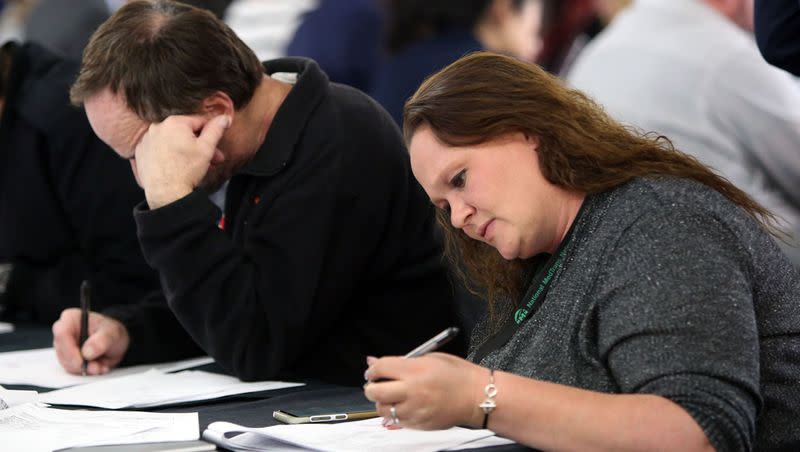Utah is behind on criminal record expungements, affecting those who are trying to ‘move on’

At a hearing on criminal record expungements, one Utah lawmaker said having a criminal record impacts people’s ability to find housing and employment, and the process of expungement in Utah can take years.
That’s why Rep. Karianne Lisonbee, R-Clearfield introduced HB252. It’s a bill that seeks to streamline the process of expungement. “Currently, our local law enforcement agencies are over half a million records behind on expungement.”
There’s a backlog that would take around five years to get through, Lisonbee said. “That backlog is filled with individuals whose misdemeanors are affecting their lives ... . We want expungement for those people. We want them to be able to move on and get expungements for their cases.”
Automatic expungements would be paused for three years. “They aren’t going away in the bill, there’s a three year pause,” Lisonbee said, adding that “even if individuals would like to have their expungement if we just simply kept the status quo, they would still be waiting more than three years if they were batched and just in the automatic expungement process.”
The bill would prioritize petition-based cases, which Lisonbee explained are “the felony cases that are really affecting people’s lives.”
Lisonbee confirmed that many of the records involved are on paper. “Local law enforcement agencies have also faced a huge burden of scouring their records to identify what to expunge,” she said. “They are literally taking papers out of files and scissors and cutting out tiny names out of papers and refiling them.”
The bill also sets the threshold for a fee waiver at or below 250% of the U.S. poverty line. The House Judiciary committee voted to amend that number to 175%. Rep. Kera Birkeland, R-Morgan made the motion to make the amendment stating that 150% is typical of Utah code and she was willing to go above that.
During public comment, Sam Knight, a criminal defense attorney, spoke in favor of the bill. “We understand that there’s unintended consequences for every bill. One of the unintended consequences for this one was that there was a flood and it couldn’t be handled,” he said, adding that “this is clearly an attempt to fix that.”
Chad Jensen, sheriff of Cache County and also representing the Utah Sheriff’s Association, spoke in favor of the bill. He also explained that expunging records can be a “tedious” process. He gave the example of expungement when there were other people involved in the incident.
“We literally go through every police report on expungement and highlight and take out one name that’s involved in that order,” Jensen said.
Darlene McDonald said that as an information technology professional, she was surprised to hear about the manual elements of the process. “I urge the legislature to have conversations with technology professionals and software developers to ensure that the state of Utah is investing in the latest technology and software that can assist with the removal of this manual process,” she said.
A woman by the name of Lisa Walker said she’s in long term recovery and “thankfully and gratefully got to experience expungement.” She requested that the bill sponsor Lisonbee take more time to discuss with the stakeholders to reconsider the pause on automatic expungements.
After the conclusion of public comment, the committee moved to favorably recommend the bill. Lawmakers did also discuss the need to take a closer look at the expungement process.
Rep. Jon Hawkins, R-Pleasant Grove said, “Like Ms. McDonald said in testimony, we need to do much better than this and we need to get Adobe or somebody involved in helping us get that done.”
The bill moved on from committee with a 10 to 1 vote. Rep. Brian King, D-Salt Lake City voted no.

